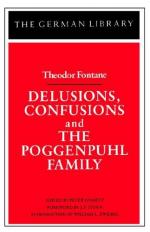|
This section contains 4,784 words (approx. 16 pages at 300 words per page) |

|
Dictionary of Literary Biography on Theodor Fontane
Theodor Fontane is generally considered the most significant realistic novelist of the German-speaking countries. For these lands Fontane consummated the development of the type of novel, the Gesellschaftsroman (novel of society), that is characteristic of such great European realists as Charles Dickens, Gustave Flaubert, and Leo Tolstoy. Fontane also paved the way for modernist trends in the novel genre: as the plots of his novels became more and more spare, he placed them more and more in the background and emphasized conversations among characters, who are grouped in socially and symbolically significant constellations. Thomas Mann, who acknowledged his debt to Fontane, developed this form of the novel with even greater complexity and profundity, summing up the epoch-making intellectual and political movements of the early twentieth century in his Der Zauberberg (1924; translated as The Magic Mountain, 1927) and Doktor Faustus (1947; translated as Doctor Faustus , 1948). But Fontane's conversational scenes reflect and...
|
This section contains 4,784 words (approx. 16 pages at 300 words per page) |

|


